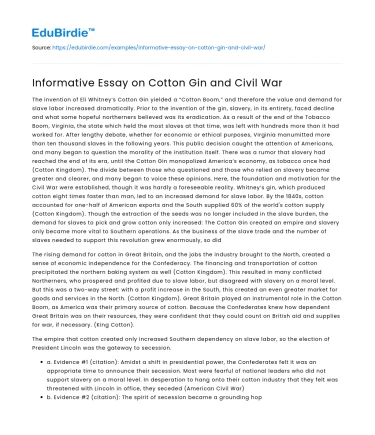The invention of Eli Whitney’s Cotton Gin yielded a “Cotton Boom,” and therefore the value and demand for slave labor increased dramatically. Prior to the invention of the gin, slavery, in its entirety, faced decline and what some hopeful northerners believed was its eradication. As a result of the end of the Tobacco Boom, Virginia, the state which held the most slaves at that time, was left with hundreds more than it had worked for. After lengthy debate, whether for economic or ethical purposes, Virginia manumitted more than ten thousand slaves in the following years. This public decision caught the attention of Americans, and many began to question the morality of the institution itself. There was a rumor that slavery had reached the end of its era, until the Cotton Gin monopolized America’s economy, as tobacco once had (Cotton Kingdom). The divide between those who questioned and those who relied on slavery became greater and clearer, and many began to voice these opinions. Here, the foundation and motivation for the Civil War were established, though it was hardly a foreseeable reality. Whitney’s gin, which produced cotton eight times faster than man, led to an increased demand for slave labor. By the 1840s, cotton accounted for one-half of American exports and the South supplied 60% of the world's cotton supply (Cotton Kingdom). Though the extraction of the seeds was no longer included in the slave burden, the demand for slaves to pick and grow cotton only increased: The Cotton Gin created an empire and slavery only became more vital to Southern operations. As the business of the slave trade and the number of slaves needed to support this revolution grew enormously, so did
The rising demand for cotton in Great Britain, and the jobs the industry brought to the North, created a sense of economic independence for the Confederacy. The financing and transportation of cotton precipitated the northern baking system as well (Cotton Kingdom). This resulted in many conflicted Northerners, who prospered and profited due to slave labor, but disagreed with slavery on a moral level. But this was a two-way street: with a profit increase in the South, this created an even greater market for goods and services in the North. (Cotton Kingdom). Great Britain played an instrumental role in the Cotton Boom, as America was their primary source of cotton. Because the Confederates knew how dependent Great Britain was on their resources, they were confident that they could count on British aid and supplies for war, if necessary. (King Cotton).
Save your time!
We can take care of your essay
- Proper editing and formatting
- Free revision, title page, and bibliography
- Flexible prices and money-back guarantee
The empire that cotton created only increased Southern dependency on slave labor, so the election of President Lincoln was the gateway to secession.
- a. Evidence #1 (citation): Amidst a shift in presidential power, the Confederates felt it was an appropriate time to announce their secession. Most were fearful of national leaders who did not support slavery on a moral level. In desperation to hang onto their cotton industry that they felt was threatened with Lincoln in office, they seceded (American Civil War)
- b. Evidence #2 (citation): The spirit of secession became a grounding hope for the Confederate states, and they had no desire to engage in a costly and destructive battle with the North—they simply wanted to be left alone (American Civil War).
I. Meaningful Conclusion/Idea about the essay:
The Cotton Boom was not simply a financial success, but an era that’s effects have shaped the future of the United States. Whitney’s Cotton Gin started a revolution, one that was settled by Civil War.






 Stuck on your essay?
Stuck on your essay?

